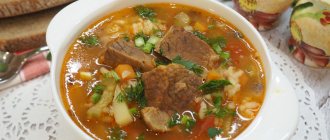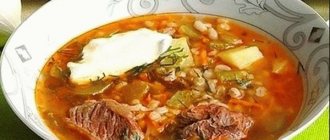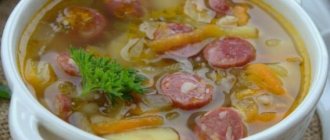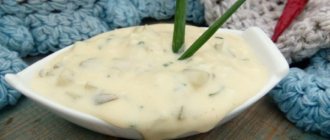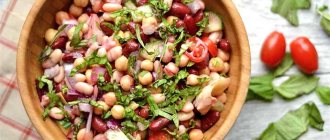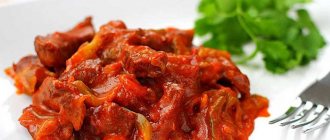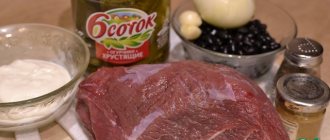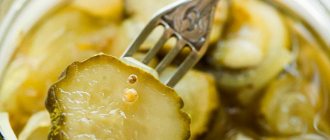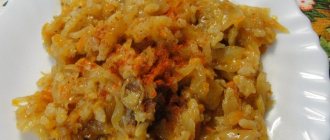Reviews (3)
15
Prepared by: Sauliute
10/30/2013 Cooking time: 1 hour 0 minutes
| Save | I cooked) | Estimate |
I want to offer you a real autumn-winter soup, rich pork pickle. This is a favorite soup of many, and mine too. I hope you will appreciate it and write it down in your notebook.
Description of preparation:
Oh, what a delicious pork pickle this recipe makes!
Here I described in detail and showed how to prepare pork pickle. If you can improve or improve anything, please share, because everyone in my family loves a pork pickle like this one, and I can’t even imagine what could be added to it. Of course, it’s good to season pork pickle with sour cream and eat it with hot black bread, just cooked. Bon appetit! Purpose: For lunch Main ingredient: Meat / Pork Dish: Soups / Pickle / Salty Geography of cuisine: Russian cuisine
Video recipe for making homemade pickle from the chef
Friends, I’m waiting for comments, click on the stars and social media. buttons. It is important for me to know your opinion, this will make the site more interesting. Join the Delicious Kitchen group on VKontakte, where new recipes are published. Best regards, Love.
Try these other dishes:
Amazingly delicious borscht with meatballs. Secrets of the right meatballs
Red lentil puree soup with smoked ribs: hearty and nutritious
How to cook Pork Rassolnik
Wash the pork ribs and cut them into pieces between the rib bones.
Place the pork ribs in a pan and fill them with water. Place on high heat; when the water boils, skim off the resulting foam, reduce the gas and simmer over low heat.
We wash the pearl barley in several waters until the water becomes clear, then fill it with cold water and set it aside to swell.
Peel the potatoes and cut into medium-sized cubes.
Peel the onions and cut into small cubes.
Peel the carrots and grate them on a coarse grater.
Fry the onion in refined sunflower oil until transparent. Add grated carrots to the frying pan along with the onions. Stir and fry over medium heat.
Cut pickled cucumbers into small cubes
Add chopped cucumbers to the pan along with the onions and carrots. Stir and fry for a few more minutes. Remove the finished frying from the stove.
When the broth is ready, add potatoes to it. Then prepared pearl barley. Place the pan on the fire, bring to a boil, then reduce the heat and cook the soup until the potatoes and pearl barley are ready.
When the potatoes and pearl barley are completely ready, add the frying mixture to the soup along with the oil in which the vegetables were fried. Stir and cook for 5 minutes over low heat. Pour the cucumber pickle into the soup, stir and cook for about 3 more minutes.
Wash and chop the dill.
Add chopped crop, bay leaf and ground pepper to the pickle to taste. Remove from the stove and let sit for 10 minutes.
Recipe for Rassolnik with pork. Calorie, chemical composition and nutritional value.
Nutritional value and chemical composition of “Rassolnik with pork”.
The table shows the nutritional content (calories, proteins, fats, carbohydrates, vitamins and minerals) per 100 grams of edible portion.
| Nutrient | Quantity | Norm** | % of the norm in 100 g | % of the norm in 100 kcal | 100% normal |
| Calorie content | 48.6 kcal | 1684 kcal | 2.9% | 6% | 3465 g |
| Squirrels | 2.2 g | 76 g | 2.9% | 6% | 3455 g |
| Fats | 2.7 g | 56 g | 4.8% | 9.9% | 2074 g |
| Carbohydrates | 3.9 g | 219 g | 1.8% | 3.7% | 5615 g |
| Organic acids | 43.2 g | ~ | |||
| Alimentary fiber | 1.6 g | 20 g | 8% | 16.5% | 1250 g |
| Water | 88.4 g | 2273 g | 3.9% | 8% | 2571 g |
| Ash | 1.049 g | ~ | |||
| Vitamins | |||||
| Vitamin A, RE | 68.8 mcg | 900 mcg | 7.6% | 15.6% | 1308 g |
| beta carotene | 0.413 mg | 5 mg | 8.3% | 17.1% | 1211 g |
| Vitamin B1, thiamine | 0.079 mg | 1.5 mg | 5.3% | 10.9% | 1899 |
| Vitamin B2, riboflavin | 0.026 mg | 1.8 mg | 1.4% | 2.9% | 6923 g |
| Vitamin B4, choline | 8.3 mg | 500 mg | 1.7% | 3.5% | 6024 g |
| Vitamin B5, pantothenic | 0.131 mg | 5 mg | 2.6% | 5.3% | 3817 g |
| Vitamin B6, pyridoxine | 0.097 mg | 2 mg | 4.9% | 10.1% | 2062 g |
| Vitamin B9, folates | 2.918 mcg | 400 mcg | 0.7% | 1.4% | 13708 g |
| Vitamin C, ascorbic acid | 1.7 mg | 90 mg | 1.9% | 3.9% | 5294 g |
| Vitamin E, alpha tocopherol, TE | 0.354 mg | 15 mg | 2.4% | 4.9% | 4237 g |
| Vitamin H, biotin | 0.159 mcg | 50 mcg | 0.3% | 0.6% | 31447 g |
| Vitamin K, phylloquinone | 0.4 mcg | 120 mcg | 0.3% | 0.6% | 30000 g |
| Vitamin RR, NE | 0.9191 mg | 20 mg | 4.6% | 9.5% | 2176 g |
| Niacin | 0.445 mg | ~ | |||
| Macronutrients | |||||
| Potassium, K | 129.67 mg | 2500 mg | 5.2% | 10.7% | 1928 |
| Calcium, Ca | 25.51 mg | 1000 mg | 2.6% | 5.3% | 3920 g |
| Magnesium, Mg | 9.8 mg | 400 mg | 2.5% | 5.1% | 4082 g |
| Sodium, Na | 694.2 mg | 1300 mg | 53.4% | 109.9% | 187 g |
| Sera, S | 40.58 mg | 1000 mg | 4.1% | 8.4% | 2464 g |
| Phosphorus, P | 32.3 mg | 800 mg | 4% | 8.2% | 2477 g |
| Chlorine, Cl | 2804.33 mg | 2300 mg | 121.9% | 250.8% | 82 g |
| Microelements | |||||
| Aluminium, Al | 120.2 mcg | ~ | |||
| Bor, B | 18 mcg | ~ | |||
| Vanadium, V | 17.48 mcg | ~ | |||
| Iron, Fe | 0.512 mg | 18 mg | 2.8% | 5.8% | 3516 g |
| Yod, I | 1.6 mcg | 150 mcg | 1.1% | 2.3% | 9375 g |
| Cobalt, Co | 2.915 mcg | 10 mcg | 29.2% | 60.1% | 343 g |
| Lithium, Li | 9.226 mcg | ~ | |||
| Manganese, Mn | 0.0565 mg | 2 mg | 2.8% | 5.8% | 3540 g |
| Copper, Cu | 64.01 mcg | 1000 mcg | 6.4% | 13.2% | 1562 g |
| Molybdenum, Mo | 8.461 mcg | 70 mcg | 12.1% | 24.9% | 827 g |
| Nickel, Ni | 2.379 mcg | ~ | |||
| Tin, Sn | 3.32 mcg | ~ | |||
| Rubidium, Rb | 69.3 mcg | ~ | |||
| Selenium, Se | 0.038 mcg | 55 mcg | 0.1% | 0.2% | 144737 g |
| Titanium, Ti | 0.3 mcg | ~ | |||
| Fluorine, F | 57.09 mcg | 4000 mcg | 1.4% | 2.9% | 7006 g |
| Chromium, Cr | 2.94 mcg | 50 mcg | 5.9% | 12.1% | 1701 g |
| Zinc, Zn | 0.3676 mg | 12 mg | 3.1% | 6.4% | 3264 g |
| Digestible carbohydrates | |||||
| Starch and dextrins | 2.882 g | ~ | |||
| Mono- and disaccharides (sugars) | 1.1 g | max 100 g | |||
| Glucose (dextrose) | 0.18 g | ~ | |||
| Sucrose | 0.328 g | ~ | |||
| Fructose | 0.071 g | ~ | |||
| Essential amino acids | 0.101 g | ~ | |||
| Arginine* | 0.022 g | ~ | |||
| Valin | 0.023 g | ~ | |||
| Histidine* | 0.007 g | ~ | |||
| Isoleucine | 0.018 g | ~ | |||
| Leucine | 0.026 g | ~ | |||
| Lysine | 0.024 g | ~ | |||
| Methionine | 0.006 g | ~ | |||
| Methionine + Cysteine | 0.012 g | ~ | |||
| Threonine | 0.017 g | ~ | |||
| Tryptophan | 0.006 g | ~ | |||
| Phenylalanine | 0.022 g | ~ | |||
| Phenylalanine+Tyrosine | 0.038 g | ~ | |||
| Nonessential amino acids | 0.171 g | ~ | |||
| Alanin | 0.02 g | ~ | |||
| Aspartic acid | 0.046 g | ~ | |||
| Glycine | 0.019 g | ~ | |||
| Glutamic acid | 0.101 g | ~ | |||
| Proline | 0.03 g | ~ | |||
| Serin | 0.024 g | ~ | |||
| Tyrosine | 0.016 g | ~ | |||
| Cysteine | 0.006 g | ~ | |||
| Sterols (sterols) | |||||
| beta sitosterol | 1.239 mg | ~ | |||
| Saturated fatty acids | |||||
| Saturated fatty acids | 0.1 g | max 18.7 g | |||
| 16:0 Palmitinaya | 0.052 g | ~ | |||
| 18:0 Stearic | 0.028 g | ~ | |||
| 20:0 Arakhinovaya | 0.002 g | ~ | |||
| 22:0 Begenovaya | 0.004 g | ~ | |||
| Monounsaturated fatty acids | 0.169 g | min 16.8 g | 1% | 2.1% | |
| 16:1 Palmitoleic | 0.001 g | ~ | |||
| 18:1 Oleic (omega-9) | 0.167 g | ~ | |||
| Polyunsaturated fatty acids | 0.387 g | from 11.2 to 20.6 g | 3.5% | 7.2% | |
| 18:2 Linolevaya | 0.387 g | ~ | |||
| 18:3 Linolenic | 0.01 g | ~ |
The energy value of Rassolnik with pork is 48.6 kcal.
Primary Source: Created in the application by the user. Read more.
** This table shows the average levels of vitamins and minerals for an adult. If you want to know the norms taking into account your gender, age and other factors, then use the “My Healthy Diet” application.
Calorie content of foods possible in the dish
- Onion – 41 kcal/100g
- Jacket potatoes – 74 kcal/100g
- Fried potatoes – 192 kcal/100g
- Ripe potatoes – 80 kcal/100g
- Boiled potatoes – 82 kcal/100g
- Baked potatoes – 70 kcal/100g
- Mashed potatoes – 380 kcal/100g
- Boar ham – 113 kcal/100g
- Pork – 259 kcal/100g
- Pork – lean roast – 184 kcal/100g
- Pork – chop on the bone – 537 kcal/100g
- Pork – shoulder – 593 kcal/100g
- Pork – schnitzel – 352 kcal/100g
- Fatty pork – 333 kcal/100g
- Pork meat – 357 kcal/100g
- Pearl barley – 340 kcal/100g
- Carrots – 33 kcal/100g
- Boiled carrots – 25 kcal/100g
- Dried carrots – 275 kcal/100g
- Bay leaf – 313 kcal/100g
- Vegetable oil – 873 kcal/100g
- Tomato paste – 28 kcal/100g
- Black peppercorns – 255 kcal/100g
- Salt – 0 kcal/100g
- Pickled cucumbers – 11 kcal/100g
- Greens – 41 kcal/100g
- Fresh frozen soup greens in packaging – 41 kcal/100g
- Brine – 1 kcal/100g
Calorie content of foods: Pork, Potatoes, Barley, Carrots, Onions, Pickles, Brine, Tomato paste, Vegetable oil, Greens, Bay leaf, Peppercorns, Salt
Rassolnik with rice and pickles with pork or beef
Many people can consider this soup a classic recipe for pickle soup with rice because pork broth is very popular for its taste and the availability of pork meat on store shelves, and we have long loved beef for the taste of the broth and low calorie content.
You may be interested in: Lentil soup. 9 recipes for making hearty and healthy soup
Pork is a fairly tender meat with a mild taste that does not require much time to cook, which is why it is so convenient to use for soup. The broth will be rich and very satisfying. But it is not recommended to use too fatty parts of the pork carcass. The soup comes out well from the shoulder with the bone. According to many housewives, the bones give the broth a special flavor.
Making beef broth will require more time, which will be spent pre-cooking the meat. Don't forget to skim the foam from the meat broth and turn on the stove over medium heat. Meat cooked covered over low heat comes out softer.
For the pickle you will need:
- pork or beef - 300-400 grams,
- potatoes - 3-4 pieces,
- carrots - 1 piece,
- onion - 1 onion,
- salted or pickled cucumbers - 4-5 pieces,
- white rice - 0.5 cups,
- greens - to taste.
Preparation:
1. To prepare the broth, wash the meat and cut it into not very large pieces if you are using boneless meat for soup. If the meat is on the bone, you can cook it whole, but be sure to rinse it very well so that you don’t get any small bone fragments. When the meat broth with bones is ready, you may need to strain it further.
2. Cook the meat until done. It can be identified by the sufficient softness and pleasant aroma of the meat broth. If you remember to skim off the foam, the broth will turn out clear. It is enough to cook pork for about an hour; for beef, the period increases to 1.5-2 hours, depending on how hard the meat was used. Long simmering under a lid over low heat has a good effect on both beef and pork, but will require longer cooking.
3. When the meat is ready, cut the potatoes into cubes and add to the meat broth. The meat on the bone can be removed from the broth to separate the meat from the bone and then added back to the soup.
4. At the same time as the potatoes, rice is added to the broth. Before this, it must be rinsed with water several times until the excess starch, visible in the water in the form of a cloudy white precipitate, disappears. With washed rice, the soup will not become cloudy and the broth will be clear.
5. While the potatoes and rice are cooking, prepare the fried onions and carrots. To do this, finely chop the onion and grate the carrots on a coarse grater. Heat the vegetable oil in a frying pan and first fry the onion until lightly browned, then add the carrots to it. Stir fry the vegetables for a few minutes. You can cover with a lid and simmer lightly until the onions and carrots become soft. Remove the finished frying from the plate and leave until the potatoes and rice are ready.
6. If you are preparing pickles with pickles and rice, then the most characteristic ingredient in it is, of course, cucumbers. They are added to the soup at the very end of cooking, because they do not need to be boiled, just letting them simmer for just a couple of minutes is enough. For pickle, cucumbers must be finely chopped or grated on a coarse grater; this will depend only on your taste, whether you and your family like cucumber pieces to come across.
7. When the potatoes and rice are cooked until tender, put the chopped cucumbers in the pan, cook them for two to three minutes, then add the fry and mix well. Add bay leaf to soup.
8. Add salt to the soup to taste, keeping in mind that pickles will already have a slight saltiness. Be sure to taste the broth to see if there is enough salt. You can add ground black pepper for flavor and fresh herbs. Allspice peas are also great, literally 2-3 peas.
If desired, you can add a few tablespoons of cucumber brine that remains in the jar to such a pickle; this will give the broth a more pronounced taste of cucumbers. But keep in mind that this will also increase the salt content; do not over-salt the soup later.
Be sure to let the finished soup steep for at least 15 minutes, preferably half an hour. During this time, all components of the soup are saturated with each other’s aromas and the pickle with pickles and rice will turn out unforgettably delicious.
You can serve the soup with sour cream, garlic croutons and herbs. A wonderful family dinner is ready!
